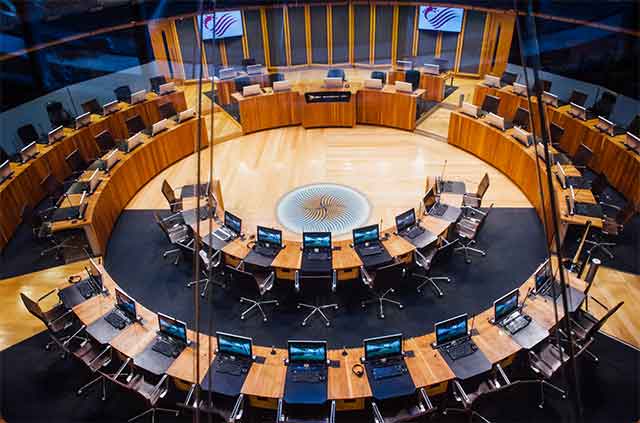GWENT’S Labour-run councils have given a muted reaction to their funding increases from the Welsh Government – but warned of cuts to come.
Newport City Council is getting the biggest percentage funding increase of any council in Wales, at 4.7 per cent and worth £13.67 million, but its leader has said is funding settlement is “still well behind where we need to be” due to a “rapidly” growing population.
Other councils in Gwent have received less than the 3.1 per cent the Welsh Government has allocated as the core funding for local government, which itself is below the current UK rate of inflation of 3.9 per cent.
Caerphilly Borough Council, which is only getting a 2.3 per cent rise said “any increase is welcomed” but warned it still faces “significant financial pressures and it is inevitable that difficult choices will need to be made.”
Blaenau Gwent said it had thought it would need to make cuts of £10 million but it will now assess its plans and described its 2.6 per cent rise as “slightly better than we had anticipated.”
However a council statement warned: “We are still well below the Welsh average increase, we will now need to work through the detail and see how this will affect our financial planning and next year’s budget.
“This will inevitably mean changes to valued services.”
Despite the biggest increase Newport council’s Labour leader Jane Mudd said there is still uncertainty over the total amount of funding councils will receive iin other grants usually paid throughout the year or for specific services.
She said: “Newport’s population has grown considerably and rapidly over recent years, and although we are pleased that we are now getting our rightful share of the Welsh Government grant taking into consideration that growth, the additional pressure it puts on all services significantly outweighs the funding available to us.
“We are also facing sizeable cuts to many of the grants we receive and are yet to fully understand the impact of these reductions, but it is certain to be substantial.”
Cllr Mudd said its funding setllement “does not reverse the extreme pressure on services or eliminate the gap between our available budget and the actual cost of delivering services. But it does give us some opportunity to consider how we deliver a balanced budget.”
The Conservative opposition leader in Monmouthshire has said its Labour led council should have argued for a higher funding floor, that no council can fall below, than two per cent.
Monmouthshire council has said its estimate is that it would have needed an increase of more than 10 per cent to maintain its existing services and though it wasn’t expecting to receive anywhere near that figure it learned it will only get a 2.3 per cent rise.
Leader Mary Ann Brocklesby said “We must remain pragmatic as we continue to work through a challenging period, not just for Monmouthshire, but for the country.”
Conservative opposition leader Cllr Richard John accused the Labour led administration of being too cosy with the Welsh Government.
He said: “I’m appalled that Monmouthshire Labour councillors are simply accepting this dreadful settlement because they’re so sycophantic towards Welsh Government, despite knowing it means a combination of service cuts and council tax rises for residents.
“If we had a better council administration they would be talking to other councils about challenging Welsh Government for a higher funding floor, above the current level of two per cent to help protect councils like Monmouthshire.”
The Tory councillor said the funding formula, which is agreed with local government, fails to recognise the additional costs of delivering services in rural or sparsely populated areas.
The UK Government has defended the funding it has awarded to the Welsh Government which has said since that was agreed, last year, inflation has reduced it by £1 billion.
Newport leader Cllr Mudd said: “Since the start of austerity, local government in Wales has lost over £1 billion from their budgets”.
A Caerphilly council Labour group spokesman said: “It is disappointing to receive one of the lower settlements from the Welsh Government. We do however understand the financial pressures on the Welsh Government brought about by real – terms cuts from Westminster.”
All councils will now be considering the budget plans for cabinet meetings in January which they will then present for consultation with residents before they are further debated by councillors. Councils have to agree balanced budgets and must do so by March to have a budget, and likely council tax increases, ready by April next year.
Torfaen Borough Council hasn’t responded to a request for comment but its Labour leader, Anthony Hunt, who is the finance spokesman for the Welsh Local Government Association, has warned the impact on public services across Wales due to a lack of funds for unitary authorities is “likely to be profound.”

